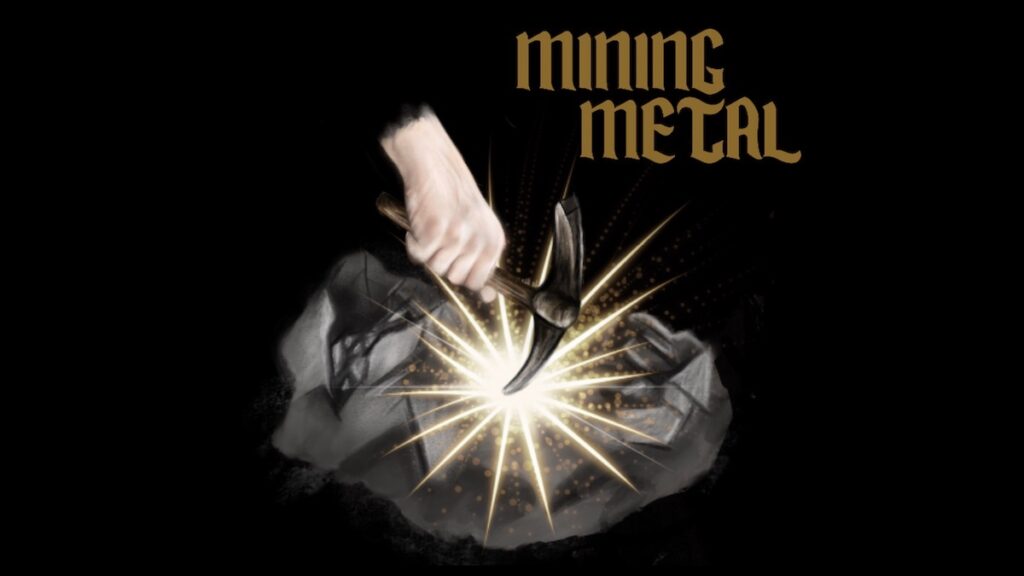Mining Metal is a monthly column from Heavy Consequence contributing writers Langdon Hickman and Colin Dempsey. The focus is on noteworthy new music emerging from the non-mainstream metal scene, highlighting releases from small and independent labels — or even releases from unsigned acts.
The duo 100 gecs recently released 10,000 gecs, earning a plenty of rave reviews. It sounds like plenty more gecs than their debut 1,000 gecs, meaning that (thankfully or not, depending on your disposition) Laura Les and Dylan Brady used their major label budget to expand their sound rather than abandon it. Aside from their humor and affinity for hook writing, the duo connected with fans through their integrity, which is not to deny that all accounts of 100 gecs being stupid, dumb, noisy, logged-on, obnoxious, irony-poisoned, and whatnot aren’t true. It’s that their honesty shines through all that, and that their honesty is necessary.
A few years ago, I interviewed Liturgy’s Haela Ravenna Hunt-Hendrix and she provided me with this wonderful quote about her concept of subjective necessity. “Something just absolutely must be a certain way aesthetically, no matter what the sacrifice, with no thought of what will come of it or whether it makes sense.” That idea has been with me ever since, informing how I interact with the music I listen to and asking me how much autonomy I have over the words I write. In my mind, it gets to the epitome of sentimentality. Some things must be the way they are because there is something inside us that dictates how we create. Sentimentality and integrity is embracing those drives while irony pushes them away and points at them, laughing. Yet heavy metal is rarely ironic.
More often than not, metal’s sincerity comes off as self-seriousness. Admittedly, there is a dearth of positive human emotion in metal’s subject matter, to the point that Metal Archives divides artists by lyrical themes, but that’s no reason to blast musicians for taking themselves seriously. In fact, metal energizes through its certainty. The Painkiller is a terrifying monstrosity because of how committed Judas Priest are to presenting him as such, despite the fact that he’s a cyborg savior riding a space motorcycle. One could argue that this self-seriousness leads down one of two roads, stoicism or cheesiness, but the counterargument is that neither of those is bad in and of themselves. They’re products of that sincerity, but they’re a small price to pay for music that bleeds out its creator’s intent.
Wrapping this back to 100 gecs, it’s clear subjective necessity informs their practice too. Nobody could put as many styles and influences into a blender, drink the product, and create music in the manner they do. “Frog on the Floor” may be a dumb ska song about its titular amphibian, but Les and Brady sound like they love that frog. The point is that intention, commitment, and delivery are sewn into 100 gecs’ core the same way they are integral to metal. Nothing summarizes that better than the Ohio death metal band Sarcoughphagus, who introduce their track “Self-Induced Lobotomy” during live shows by stating it’s a song “about giving yourself a lobotomy.” Though I’ve never given myself a lobotomy, Sacroughphagus’ delivery leads me to believe that if I did, it’d feel like their track.
— Colin Dempsey,
Contributing Writer
Astriferous – Pulsations of the Black Orb
“Costa Rican death metal” is a very magical four-word phrase, like an incantation, that which summons the grimiest, gnarliest, most esoteric of death metal from the void. We throw around terms sometimes like dissodeath, HM-2, progressive death, lots of microgenres like that, but at heart these are aspects that any truly well-rounded death metal troupe will have in the pocket, ready for deployment at a moment’s notice. Astriferous scratches deep that itch for precisely those most death metal of elements, turning on a dime from technically demanding riffs to low IQ headbangers, abstract song structures to super catchy repeating riffs. This is, simply, death metal done right, in all its messy, gory, science-fiction glory. Buy it on Bandcamp. – Langdon Hickman
Dawn Ray’d – To Know the Light
Prior to releasing To Know the Light, Dawn Ray’d were a solid band who were easy to pigeonhole. Combine anarchism, Norwegian second-wave black metal, and a violin, and you’d get a rough yet accurate idea of the trio. Their third full-length supersedes the quality of all which came before it. Their black metal is more pointed and thorny, their politics rally for tangible actions, and they invest in activism’s folk roots. To Know the Light implements brick-and-mortar folk traditions, best evidenced by “Requital,” a protest song in its purest form. It’s a simple harmonized vocal performance that captures the album’s intentions. It’s about creating joy with those around you as a means of resistance. That humanizing aspect balances Dawn Ray’d’s expressionist black metal to present the full spectrum of emotions amid the status quo; empathy, rage, frustration, and — vitally — hope. Buy it on Bandcamp. – Colin Dempsey
Dirge – Dirge
I openly long for the days of the dominance of Cult of Luna and Isis. I love, of course, riff-driven heavy metal and love weird, bizarre experimentalism. But there’s little that grabs me as much as the emotionalism of those types of post-metal bands, at least before the oversaturation of the market that led inevitably to its death. Dirge for me feel like a lost record from those peak years, dialing in exactly the right mixture of atmospheric sludge and psychedelic doom, spiced up with hardcore-driven vocal delivery, to really make the music work. I don’t think its uncommon to carry, via life or politics or the pathways of memory and fantasy, the crushing disfiguring weights of grief. That this record is so keenly shaped to tap into a cathartic outpouring of that immensity of latent grief is a gift. Buy it on Bandcamp. – Langdon Hickman

